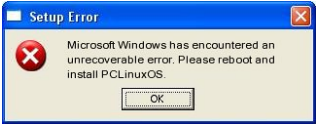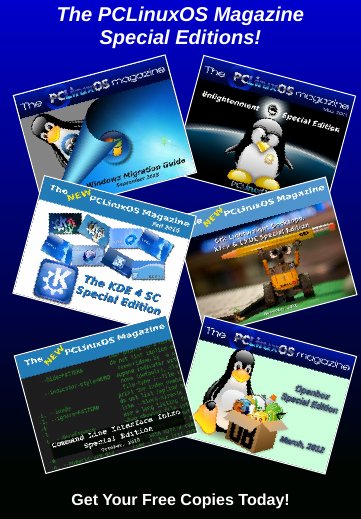| Previous
Page |
PCLinuxOS
Magazine |
PCLinuxOS |
Article List |
Disclaimer |
Next Page |
Of Mice, Men & Magazine |
|
by Paul Arnote (parnote) Last month, we ran an article from Agent Smith that caused a shiitake mushroom storm. Quite literally. Agent Smith, a.k.a. Alessandro Ebersol, is a frequent contributor to The PCLinuxOS Magazine. He has stepped up to help produce exclusive content for The PCLinuxOS Magazine when virtually no one else would. He is passionate about battling the continuing and continued overreach of Big Tech. He is passionate about PCLinuxOS. He is passionate about gaming on PCLinuxOS. Living in Brazil, he sometimes has a different take on events than many of the other people who volunteer for The PCLinuxOS Magazine. Out of the storm that developed from "that" article, it has become apparent that there are some significant misunderstandings or misconceptions about the magazine that need to be cleared up. That is the reason for this article. History Of The PCLinuxOS Magazine As unfortunate as it is, many of the original discussions that led to the formation of The PCLinuxOS Magazine are largely lost. Those existed on a long ago forum (MyPCLinuxOS.com), that hasn't been around for years. The MyPCLinuxOS forum existed as a place for experimentation and to try out new ideas. It was closed down and everything (except the posts) were brought into the main PCLinuxOS forum. Many of the discussions occurred as private messages between various key members, so those are for sure lost forever into the digital ethernet. In fact, few of those involved in the formation of The PCLinuxOS magazine remain around the PCLinuxOS corner of the Linux universe from that time. 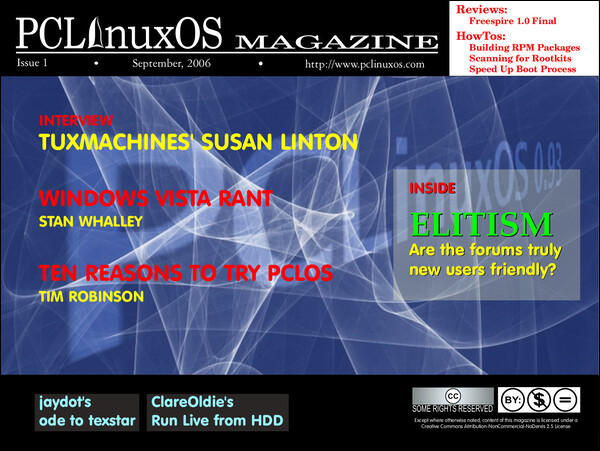 In September 2006, the inaugural issue of The PCLinuxOS Magazine was released. You can still download it, as well as every other issue ever published, from the magazine's website. For the next couple of years, The PCLinuxOS Magazine came out with a new issue on a monthly basis. Then, a certain past editor claimed there wasn't enough to write about for a monthly magazine, and shifted the publication schedule to quarterly. But even coming up with a new issue every three months was too much for him. He was also tied up with a group of developers and packagers who attempted to wrestle PCLinuxOS away from Texstar's control. Through some chicanery, he tried to "shut the magazine down." There were some of us (some of whom are no longer around) who said "not so fast!" Those developers who attempted their coup left to form their own distro, and he followed them. 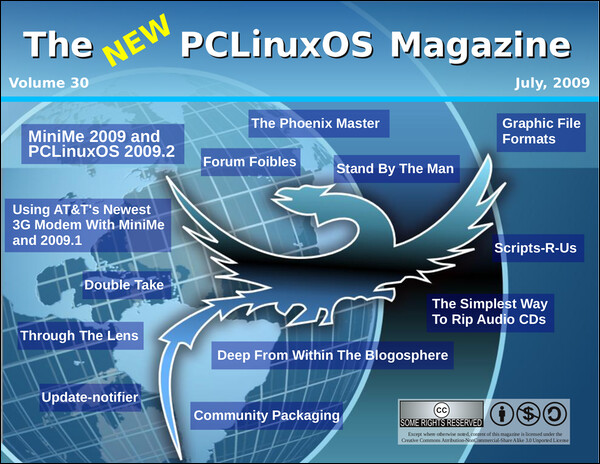 That is where I stepped up. Archie, who was involved with the discussions that led to the formation of The PCLinuxOS Magazine, went looking for someone to lead the magazine. With my journalism background, I stepped forward to assume the role of Chief Editor. That was in July 2009. Originally, that was supposed to be for only a year or two. However, I've been in that position ever since. Since I've taken over as the magazine's editor, we've yet to miss a monthly release of the magazine in 13 years. There is plenty to write about, if you just look around. There are thousands of programs just in the PCLinuxOS repository alone. In addition, we've produced several "special editions" of the magazine. Meemaw replaced Andrew Strick as the assistant editor in September 2009, and has excelled at her position ever since. After a couple of years of seeing that I had the best interests of PCLinuxOS in mind and at heart, and seeing that I wasn't going to try to undermine the magazine, Texstar turned the magazine over to me. I'd like to think that I've yet to let him down or to betray the trust he placed in me. If that has happened, he has yet to voice his opposition or dissatisfaction. Challenges Facing The Magazine It's important to keep in mind that I, Meemaw, and everyone else who works on and contributes to the magazine does so on a volunteer basis. That means we "also" fit the magazine duties into our everyday lives, as time and the situations allow. I can attest that over the past 13 years that I've headed up the magazine, there have been MANY months where the ONLY contributors were the same three or four people. Multiple pleas over the years for contributions from the PCLinuxOS community have gone largely ignored, so the monthly production of the magazine falls to the same three or four people to make the magazine a reality. 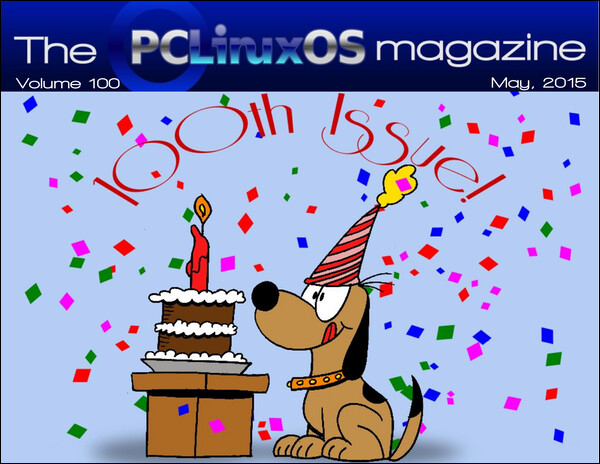 To be perfectly honest, there were many, many months that the largest part of the magazine ... the article ideas, writing the articles, etc. ... fell solely to Meemaw and I. Month after month we'd have to come up with article ideas and then write those articles. Had we not done so, there wouldn't have been a magazine published those months. Long ago I lost count of how many times we'd look at what we had for the magazine come time to layout the magazine, and decide that there just wasn't enough content for that month. Then, one of us would rush off to try to whip out another article or two for that next month's issue at the last moment. Currently, we have the largest number of community contributors that we've had in a VERY LONG TIME. Some contributors can be counted on contributing something every single month. Others, because of "life commitments," contribute on a semi-regular basis, as they are able. That's the nature of having an all volunteer "staff" of contributors. Having contributions from the PCLinuxOS community certainly takes a LOT of stress off of Meemaw and me. It also allows for a wider range of views to be presented, and draws from a more varied experience pool. Forum != Magazine, Magazine != Forum One thing became quickly apparent during this fracas. There seems to be this belief among some PCLinuxOS users that the forum rules extend to the magazine. As much as anyone might want that to happen, that isn't the case, and never has been the case. The two are VASTLY different entities, so what applies to one doesn't work so well for the other. Specifically, the confusion is that political discussions are verboten in the magazine, as they are in the forum. I will state that political hot topics are avoided as much as possible, but it isn't entirely possible 100 percent of the time, for reasons I'll illustrate shortly. The forum by its very nature allows for a back-and-forth debate-like environment for users to have discussions. It's very easy for political hot topics to escalate into a raging argument in less than a heartbeat. The forum is populated with users from all walks of life, from many different cultures, and many different countries. Meanwhile, the magazine exists to deliver news and features of interest to (primarily) PCLinuxOS users. Just like your evening newspaper, the magazine is not a forum for debate. I am acutely aware that many non-PCLinuxOS users also read the magazine, but serving PCLinuxOS users is our primary focus. The PCLinuxOS Magazine is probably one of (if not THE) oldest, longest running, regularly published distro-based magazine in existence. It used to be a lot easier to avoid political hot topics in the magazine. When I started in this position, Big Tech wasn't using their power to influence public opinion and to silence dissenting views. At least, if they were, they weren't doing so quite as openly. They, in effect, stayed in their lane of providing a service or a platform. 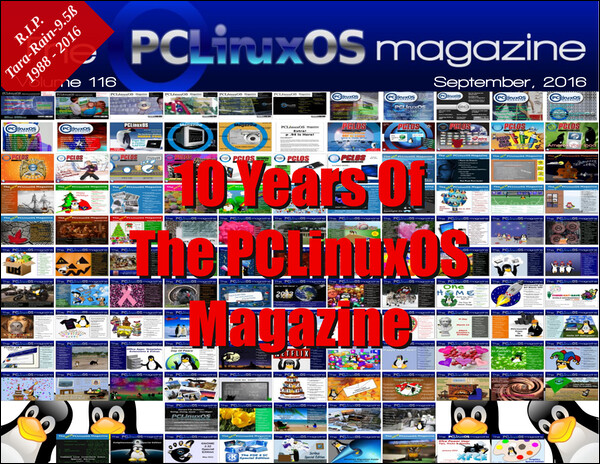 Back then, we didn't really have the degree of political divisiveness that current besieges users of all backgrounds. The "cancel culture" is a recent abomination where one group of users leverage social media platforms to silence those who disagree with them. It has led to a "mob mentality" that effectively and ultimately shuts down open discussion and healthy debate. But today, Big Tech openly wields its power to influence public opinion and to silence dissenting and unpopular views. They do this by manipulating search results, or putting users with dissenting views into "jail," or even banning users from the platforms that have become the new "town square." Big Tech, by veering out of their assigned lane of providing a service or platform, has politicized the content they serve up by giving a voice to certain points of view and by silencing all dissenting views. As unfortunate as it is, every single user who connects to the internet is affected by these Big Tech shenanigans. That makes them newsworthy. And, part of the magazine's job is to publish news, and this is news that affects users in the most visceral way. There are very few in society as a whole who don't interact with Big Tech, and even fewer computer/Linux users who aren't affected by Big Tech's actions. Had Big Tech "stayed in its lane" and not become a political player, then politics would never have to come into the discussion. Sadly, that isn't the reality, nor the world we live in now. With Big Tech embracing certain political views and trying to silence opposing views, they have inextricably married politics into things that shouldn't be about politics at all. Thus, when reporting on Big Tech, it's very often impossible to separate the politics from the tech and deeds/misdeeds of Big Tech. Role Of The PCLinuxOS Magazine One of the comments about Agent Smith's article said that politics had no place in a magazine that was about PCLinuxOS. And, for the most part, I agree. But, we have to keep in mind the previous discussion above about how Big Tech veered out of its lane of providing a service and a platform, and into a lane where it takes a much more political role in the events of the day. If you don't think that is true, then you might want to ask yourself why Big Tech has been called to task by lawmakers all over the world for their actions. Well, The PCLinuxOS Magazine isn't just about PCLinuxOS. Certainly, covering PCLinuxOS is very, very high on that list. But, more specifically, The PCLinuxOS Magazine is more about publishing articles that not only interest PCLinuxOS users, but also covering topics that impact their daily dealings and lives. Virtually every user who ventures out onto the web has dealings -- good and bad -- with Big Tech. 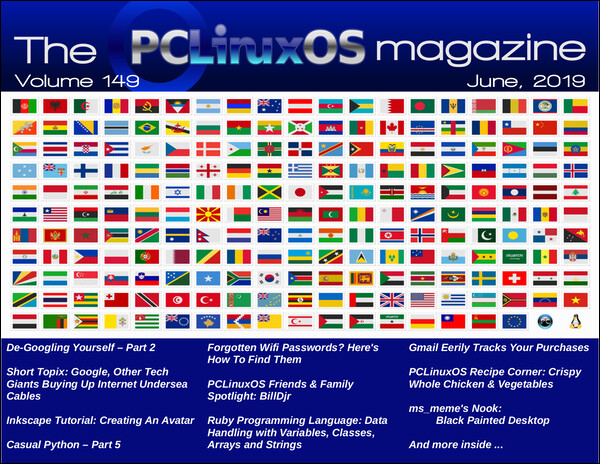 Just like when you read your local/favorite newspaper, or when you watch the evening news, not all of the news is "happy" news. You're certain to disagree with some of that news. But, it is published nonetheless. So, should we suppress the things we don't necessarily agree with? I say no. Call me "old fashioned" if you want, but the only true way to gain knowledge and power is by examining all views, and then making an informed decision. To do otherwise makes us no better than those we are "reporting on" for having a narrow focus and attempting to silence voices. We become no better than the "Cancel Culture" mob/plague that floats around the internet like a swarm of locusts, looking to consume and ruin their next victim. We mustn't feed into that mentality. We mustn't feed that beast. Especially if we want this scourge to die and go away. According to the polls and rhetoric I'm seeing and hearing, the vast majority of people want to see this whole "Cancel Culture" thing die off yesterday. All reasonable voices deserve to be heard. All reasonable voices deserve to have a chance to add to the debate. No one has to agree with everything or anything that's printed. But at least the right and ability to say it won't be impeded. It's only when all sides are heard and have a voice that our world can truly be inclusive. It's only when all sides are heard and have a voice that we can make an informed decision about where we stand on an issue. Without it, the best we can be are sheeple. In Summation When Agent Smith submitted his article, in no way did I ever see it as him supporting Putin. What I saw was Agent Smith using the current war between Ukraine and Russia as a way to illustrate how Big Tech continues to play political games by trying to influence public opinion. Those political games have consequences for those who have nothing to do with the war, fostering hatred and repercussions against innocent people just because of their heritage or ancestry. In this particular case, it's Russian expats and those with Russian heritage who are suffering the consequences, despite having nothing to do with the current war. Could he have used another situation to serve as a metaphor? Perhaps. But he chose to use a current event that is at the forefront of all of the recent news cycles. Even he agrees that the war is bad. And, knowing Agent Smith as I do after his contributions over the years to The PCLinuxOS Magazine, I also know he meant no malice. I also know that he never thought anyone would view his article as him throwing his support behind Putin. Agent Smith is a good writer, and has contributed to the magazine for several years now. And, despite English not being his native language (that would be Brazilian Portuguese), I find that his articles ... submitted in English ... require only minor editing. With the divisive political climate we're all living in, it's not uncommon for people to latch onto something that they perceive as wrong, and ignore the overall message. I think that is EXACTLY what happened in this particular case. In a way, it's a case of not being able to see the forest for the trees. Any more, people want to focus on the things that they find "egregious" and ignore all the rest. As the Chief Editor of The PCLinuxOS Magazine who has had what I've been told is a pretty good track record, I stand behind Agent Smith. Moreover, I stand behind his right to say it, even if I don't agree with it. Meanwhile, the plan for The PCLinuxOS Magazine is to continue exactly as we have over the past 13 years. That means that we will attempt to steer clear of political hot topics when we can. And for those times when we can't ... well, they will most likely find their way into the article. |

